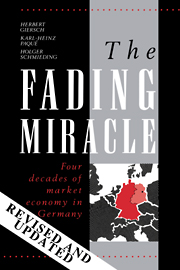Book contents
7 - A new miracle?
Published online by Cambridge University Press: 09 February 2010
Summary
At least in its first five chapters, this book has told the story of a fading miracle. The main economic messages of this story may be summarized as follows:
(i) After three dismal years of central administration by the Allied authorities, the West German economy was subjected to a shock therapy of radical monetary reform and price liberalization. This combined treatment proved extraordinarily successful: it unleashed supply-side forces and allowed for a very fast reconstruction and a thorough structural adjustment of the economy's productive potential within about two years. Because of the strict stability orientation of monetary and fiscal policy, an initial surge of corrective price inflation could be kept at bay without any major macroeconomic disruptions.
(ii) In the 1950s, the early momentum of reconstruction became a genuine growth miracle. Given the ample supply of highly mobile and well-trained surplus labour, the only temporary impediment to high growth and the reduction of unemployment was the shortage of capital. This could be overcome mainly through high business profits, which were heavily favoured by tax exemptions to give firms the financial leeway to carry out the necessary investment projects, despite a still very narrow capital market. Foreign aid – notably US aid through the European Recovery Program – was only of minor economic importance for the process of capital formation, although it may well have been a very important political indicator for the American presence in Europe, which raised private investors' confidence in political stability and thus facilitated the reintegration of West Germany into the world economy.
[…]
- Type
- Chapter
- Information
- The Fading MiracleFour Decades of Market Economy in Germany, pp. 273 - 279Publisher: Cambridge University PressPrint publication year: 1992

